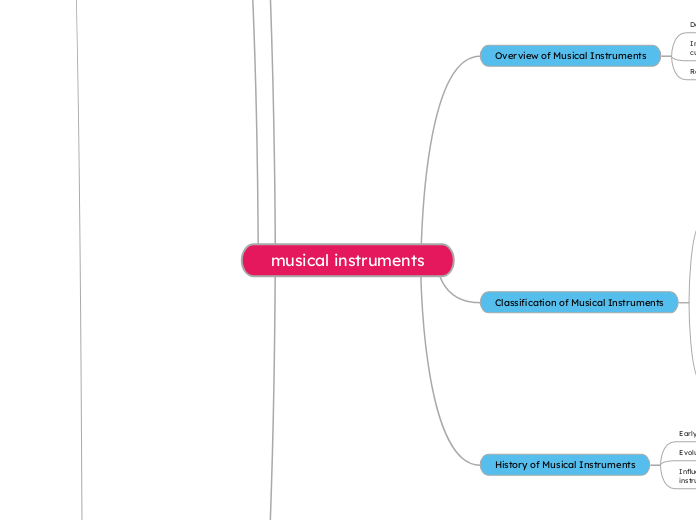por Vicky Tsarouha 1 ano atrás
179
musical instruments

por Vicky Tsarouha 1 ano atrás
179

Mais informações
Provides a platform for artistic expression and cultural exchange
Allows for social interaction and participation in group settings
Boosts confidence
and promotes relaxation
reduces stress
Provides a means of self-expression and emotional release
Stimulates brain development and improves coordination
Enhances memory
and problem-solving skills
concentration
Iconic violin compositions such as Bach's "Sonatas and Partitas" and Vivaldi's "The Four Seasons"
Virtuosos like Itzhak Perlman and Niccolò Paganini
Importance of craftsmanship and materials in producing quality sound
Body
bow
strings
fingerboard
neck
Modern violin design emerged in Italy during the 16th century
Ancestor of the violin can be traced back to ancient stringed instruments like the rebec and Byzantine lyra
Different genres associated with the guitar
and flamenco
such as rock
Influential guitarists like Jimi Hendrix and Eric Clapton
Distinctions in sound production and playing style
Acoustic guitar
classical guitar
electric guitar
Development of the modern guitar in Spain during the 16th century
Origins in ancient civilizations
such as the lute in Mesopotamia and the oud in Persia
Iconic piano compositions such as Beethoven's "Moonlight Sonata" and Mozart's "Piano Concerto No
21"
Renowned pianists like Ludwig van Beethoven and Wolfgang Amadeus Mozart
Variation in size
and portability
sound quality
Grand piano
digital piano
upright piano
Invention of the modern piano by Bartolomeo Cristofori in the 18th century
Evolution from earlier keyboard instruments like the harpsichord and clavichord
Cultural exchange and trade routes facilitated the spread of musical instrument knowledge
Ancient civilizations like the Egyptians
and Romans made significant contributions to instrument design and construction
Greeks
Introduction of new materials and construction techniques
Advancements in technology and craftsmanship led to the development of more complex instruments
Early instruments included flutes made from bone and drums made from animal skins
Evidence of musical instruments dating back to prehistoric times
Reflect the cultural and spiritual practices of these communities
Instruments used by indigenous cultures around the world
Known for their unique rhythms and percussive sounds
Instruments originating from Africa
such as the djembe and kalimba
Instruments traditionally used in Eastern music traditions
such as the sitar and erhu
Examples include the piano
and flute
violin
Instruments commonly associated with Western classical music
Commonly used in pop
and electronic music
rock
Electronic instrument with keys that produce different sounds
Essential in rock
and metal genres
Guitar with electronic pickups that amplify the sound
Used in electronic music
and film scoring
pop
Electronic instrument that generates various sounds
Popular in jazz
and rock music
blues
Single-reed woodwind instrument
Commonly used in jazz and classical music
Brass instrument with a distinctive sound
Used in classical
and folk music
jazz
Woodwind instrument played by blowing across a hole
Widely used in classical and contemporary music
Keyboard instrument with strings that are struck by hammers
Prominent in classical music and orchestras
Four-stringed instrument played with a bow
Used in various genres such as rock
and jazz
classical
Versatile instrument with six strings that can be strummed or plucked
Often used to add rhythm and texture to music
Hand-held instrument with jingling metal discs or bells
Commonly used in orchestras and rock bands
Metallic instruments that produce a crashing or shimmering sound
Used to create rhythmic patterns and beats
Various types of drums
and bongo drums
snare drums
such as bass drums
They contribute to the overall composition and arrangement of music
Musical instruments provide the means to express and convey emotions through sound
They help preserve cultural heritage and identity
Musical instruments are integral to cultural traditions and rituals
Musical instruments are devices or tools used to create or produce sound
Keyboard
Electric guitar
Synthesizer
Saxophone
Trumpet
Flute
Piano
Violin
Guitar
Tambourine
Cymbals
Drums